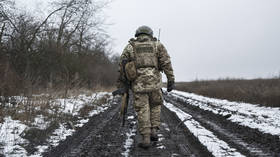NATO has secret agenda for troops in Ukraine – Russia
All the talk of sending ground forces is really about partitioning the country, Maria Zakharova has said
The reason French President Emmanuel Macron has brought up the idea of sending NATO soldiers into Ukraine is that members of the US-led bloc are plotting to divide up the country, Russian Foreign Ministry spokeswoman Maria Zakharova said on Wednesday.
Macron first suggested that no option should be off the table two weeks ago, but was publicly disavowed by most NATO members. He has since argued that France might send its own soldiers should Russia “break through to Kiev or Odessa.”
“All these statements that Macron and other NATO politicians make, about the possibility of introducing contingents or some kind of paramilitary units into the territory of Ukraine, are related to the partition of what they see as the remnants of Ukraine,” Zakharova said at a press briefing in Moscow.
Territorial aspirations help explain why Kiev has not been invited to join the bloc yet, Zakharova argued. This would require all NATO members to recognize Ukraine’s borders, and not all of them are willing to do so, she added.
They are ready to occupy and partition Ukraine.
The “moral preparation” of the population in both NATO countries and Ukraine is already underway, Zakharova said, with some politicians speaking about such an outcome openly.
“All this is happening, as usual with NATO members, under a false flag. They talk about countering Russia, but are in fact starting to divide the remains of Ukraine between themselves,” she said, adding that this should serve as a warning to those who “entrust their fate to NATO.”
As for Paris, Zakharova said, French troops invaded Russia in the early 19th century and again in the early 20th. “France would do well to remember how that ended.”
Napoleon Bonaparte invaded Russia in June 1812, with close to 700,000 French and allied troops. Six months later, fewer than 100,000 men staggered back across the Niemen River.
The second French expedition is less well known, because it was much more modest and somewhat shorter. In December 1918, Some 15,000 French soldiers landed in southern Russia as part of an Entente intervention against the Bolshevik revolutionaries. After multiple losses to the Red Army, the French expedition departed in April 1919.






Comments are closed.